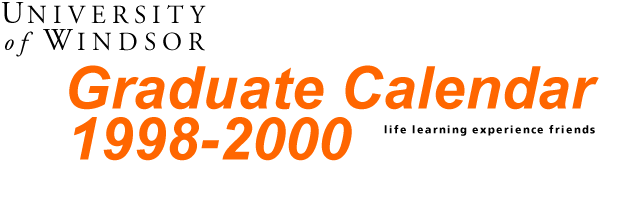17.3.1
COURSE DESCRIPTIONS—
GEOLOGY
All courses listed will not necessarily be offered in any one year.
61-542. Geochemistry of Hydrothermal Systems
Origin and chemistry of fluids in the earth's crust. Physical chemistry
of hydrothermal fluids. Fluid-mineral equilibria and wallrock alteration.
Isotope systematics of hydrothermal systems. Fluid inclusions. Transport
and deposition of ore components. (3 lecture hours a week.)
61-544. Sedimentology of Detrital Deposits
Hydrodynamic significance of primary sedimentary structures, post-depositional
modification of sediments; biostratification and trace fossils; sedimentary
environments; sedimentological methods in economic geology. (3 lecture
hours a week.)
61-545. Advanced Igneous Petrology
The petrology and petrogenesis of igneous rocks emphasizing current
concepts and recent developments. (2 lecture, 3 laboratory hours a week.)
61-548. Low-temperature Geochemistry and Diagenesis
Geochemistry of sedimentary rocks and natural waters; chemistry and
mineralogy of weathering; geochemical cycles; geochemical facies analysis;
fractionation of elements and isotopes during sedimentation; chemical diagenesis;
organic matter and mineral diagenesis; geochemical evolution of sedimentary
rocks during geologic history. (3 lecture hours a week.) (Prerequisite:
61-324 or equivalent, or permission of the instructor.)
61-549. Carbonate Sedimentology
Carbonate mineralogy, carbonate sedimentation and environments, diagenetic
processes and products, carbonate evolution through time. (Prerequisite:
61-324 or consent of instructor.) (3 lecture hours a week.)
61-551. Isotope Geochemistry
Theory, systematics, and application of radioactive and stable isotopes
in the earth sciences. Current advances in the field. Selected case studies.
(3 lecture hours a week.)
61-564. Advanced Methods in Geochemical Research
Sampling of geological materials. Sampling statistics. Modern analytical
methods in geochemistry - theory and selected applications. Data analysis.
(3 lecture and/or project hours a week.)
61-565. Geochemistry and Earth Systems
Mass and energy transfer and their relationship to geochemical cycles.
Lithosphere-atmosphere-hydrosphere-biosphere interactoins. Topics include
rock-water interaction, hydrothermal systems, weathering, volcanism, and
ocean chemistry. (3 seminar hours a week.)
61-572. Micropaleontology I
The morphology, classification, paleoecology, and geologic history
of selected microfossil groups; field and laboratory techniques of collection
and preparation. (2 lecture, 3 laboratory hours a week.)
61-573. Micropaleontology II
The application of microfossils to biostratigraphy and paleoenvironmental
interpretation. Lectures and seminars on fundamentals and selected case
histories. (Prerequisite: 61-572.) (3 lecture hours a week, including seminars.)
61-580. Graduate Seminar
Discussion of current topics in the earth sciences. (Students must
register in this course in each term of full-time registration in the M.Sc.
Program.) (1 hour a week.)
61-582. Thesis Proposal
Preparation of a written report containing: a thorough review of the
literature relevant to the proposed research topic; an outline of the proposed
research including a discussion of the expected contributions to the subject
area and how these relate to previous work; and a description of the relevant
methods. The student shall be examined by his or her Master's committee
on the content of the proposal and related background knowledge,
and shall present the proposal in a public lecture.
61-590. Special Topics
(May be taken for credit more than once provided that the topics are
different.)
61-797. M.Sc. Thesis
17.3.2 COURSE DESCRIPTIONS—
GEOLOGICAL ENGINEERING
90-550. Valuation of Ore Deposits
Ore reserve calculation methods; supply and demand factors and their
projection; capitalization, discounting and amortization of ore deposits;
marketing including cartels, taxation, legislation and national interest.
(3 lecture hours a week.)
90-552. Geologic Origin and Properties of Industrial Rocks and Minerals
Occurrence, origin, exploration and exploitation methods; physical
and chemical properties of industrial minerals and their uses; economics
of industrial rocks and minerals; potential uses of mineral processing
byproducts. (3 lecture hours a week.)
90-553. Physical Properties and Causes of Deterioration of Construction
Materials
Geologic and physio-chemical factors affecting the stability of construction
materials (rock aggregate, expanded aggregate, tile, brick, etc.) under
conditions of natural weathering and exposure to salts and other pollutants.
(3 lecture hours a week.)
90-556. Applied Geophysics in Mineral and Petroleum Exploration
An introduction to the use of geophysics to find deep-seated ore and
petroleum deposits emphasizing gravitational, magnetic, induced potential,
and other relevant methods. (3 lecture hours a week.)
90-559. Underground Storage
Exploitation of subsurface space for storage of industrial products
and wastes. Possible environmental impact of poorly planned underground
storage. Economics of subsurface vs. surface storage. Emphasis on Canadian
case histories. (3 lecture hours a week.)
90-560. Petrology of Mineral Deposits
Examination of the geology, geochemistry, and types of important mineral
deposits. Methods used in the study of mineral deposits. (Prerequisite:
61-542 or consent of instructor.) (3 seminar hours a week.)
90-561. Advanced Geochemical Exploration
Recent advances in geochemical exploration techniques. Topics such
as: volatile and airborne surveys, surveys in contaminated terrains, geochemical
prospecting in glaciated terrains, isotope methods. Interpretation and
handling of survey data. (3 lecture hours a week.)
90-580. Graduate Seminar
Discussion of current topics in the earth sciences. (Students must
register in this course in each term of full-time registration in the M.A.Sc.
Program.) (1 hour a week.)
90-582. Thesis Proposal
Preparation of a written report containing: a thorough review of the
literature relevant to the proposed research topic; an outline of the proposed
research including a discussion of the expected contributions to the subject
area and how these relate to previous work; and a description of the relevant
methods. The student shall be examined by his or her Master's committee
on the content of the proposal and related background knowledge,
and shall present the proposal in a public lecture.
90-590. Special Topics
Selected advanced topics in a field of research in Geology.
90-797. Thesis
|


